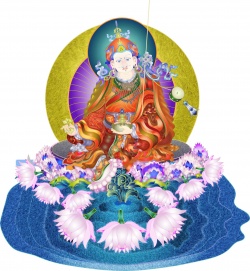Difference between revisions of "Sangphu Neuthok"
Jump to navigation
Jump to search
| Line 1: | Line 1: | ||
| − | '''[[Sangphu Neuthok]]''' (Tib. {{BigTibetan|[[གསང་ཕུ་ནེའུ་ཐོག་]]}}, [[Wyl.]] ''[[gsang phu ne'u thog]]'') - A [[Kadampa]] | + | {{DisplayImages|{{Random number}}}} |
| + | |||
| + | |||
| + | |||
| + | '''[[Sangphu Neuthok]]''' (Tib. {{BigTibetan|[[གསང་ཕུ་ནེའུ་ཐོག་]]}}, [[Wyl.]] ''[[gsang phu ne'u thog]]'') - A [[Kadampa monastery]] founded by [[Ngok Lekpé Sherab]] in 1071/2, and famous for its {{Wiki|scholarship}}. | ||
| + | |||
| + | Among its most famous [[abbots]] and [[teachers]] were [[Ngok Loden Sherab]], [[Chapa Chökyi Senge]], [[Yaktön Sangye Pal]] and [[Rongtön Sheja Kunrig]]. | ||
| + | |||
| + | The great [[Longchen Rabjam]] also studied here in his youth. | ||
| + | |||
| + | In its heyday it was home to some eleven separate {{Wiki|colleges}}, affiliated with both the [[Gelug]] and [[Sakya]] schools. | ||
| + | |||
| + | But by the end of the eighteenth century there was no resident [[community of monks]], and when [[Jamyang Khyentse Wangpo]] visited the site in the mid-nineteenth century he said it had become an ordinary village of [[lay people]] (''[[grong nag]]''). | ||
| + | |||
==Further Reading== | ==Further Reading== | ||
| − | {{Nolinking|*Onodo, Shunzo. ''Abbatial Successions of the Colleges of gSang phu sNe'u thog Monastery.'' Bull. of the National Museum of Ethmology 15 no 4 (1990) 149-1071. | + | |
| − | *van der Kuijp, Leonard. ''The Monastery of Gsang-phu Ne'u-thog and Its Abbatial Succession from ca. 1073 to 1250.'' Berliner Indologische Studien 3 (1987) pp. 103-127.}} | + | |
| + | {{Nolinking|*Onodo, Shunzo. ''Abbatial Successions of the Colleges of [[gSang phu sNe'u thog Monastery]].'' Bull. of the National Museum of Ethmology 15 no 4 (1990) 149-1071. | ||
| + | |||
| + | *van der Kuijp, Leonard. ''The Monastery of [[Gsang-phu Ne'u-thog]] and Its Abbatial Succession from ca. 1073 to 1250.'' Berliner Indologische Studien 3 (1987) pp. 103-127.}} | ||
| + | |||
| + | |||
==External Links== | ==External Links== | ||
Latest revision as of 09:36, 29 March 2016
Sangphu Neuthok (Tib. གསང་ཕུ་ནེའུ་ཐོག་, Wyl. gsang phu ne'u thog) - A Kadampa monastery founded by Ngok Lekpé Sherab in 1071/2, and famous for its scholarship.
Among its most famous abbots and teachers were Ngok Loden Sherab, Chapa Chökyi Senge, Yaktön Sangye Pal and Rongtön Sheja Kunrig.
The great Longchen Rabjam also studied here in his youth.
In its heyday it was home to some eleven separate colleges, affiliated with both the Gelug and Sakya schools.
But by the end of the eighteenth century there was no resident community of monks, and when Jamyang Khyentse Wangpo visited the site in the mid-nineteenth century he said it had become an ordinary village of lay people (grong nag).
Further Reading
- Onodo, Shunzo. Abbatial Successions of the Colleges of gSang phu sNe'u thog Monastery. Bull. of the National Museum of Ethmology 15 no 4 (1990) 149-1071.
- van der Kuijp, Leonard. The Monastery of Gsang-phu Ne'u-thog and Its Abbatial Succession from ca. 1073 to 1250. Berliner Indologische Studien 3 (1987) pp. 103-127.
